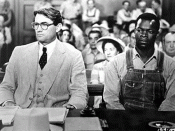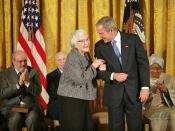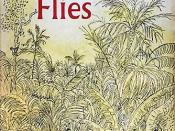"...in all of us, even in good men, there is lawless wild-beat nature..."
Plato, The Republic, Book IX
There is a second side to mankind, which is the uncivilized side. Even in the best of mankind, the wild beast can come out resulting in brutal wounding, drugs, alcohol and even killing. In the novel, The Lord of the Flies, the beast awakens within Jack and Ralph. However, in To Kill A Mockingbird, Bob Ewell and Atticus do not have a good and bad side.
Atticus, a good character and Bob Ewell, a bad character do not have a civilized side. Bob has the uncivilized nature and Atticus has the civilized nature.
An example of this is when Atticuses gets spat in the face by Bob Ewell, Atticus then responds by saying "'I wish Bob Ewell wouldn't chew tobacco,'" pg. 217. This quote shows how good Atticus is, when Bob spat on him.
At the end of the novel Atticus does not let out his anger, when the court case that he worked on did not turn out properly. He held his anger down, which a normal person would be really mad, because the accused was black which made him guilty even though he was not guilty. An example of Bob Ewell not following the critical lens is when he spat in Atticus's face after winning the trial. "Mr. Bob Ewell stopped Atticus on the post office corner, spat in his face, and told him he'd get him if it took the rest of his life." This shows the evil in Bob by stopping Atticus and threatening him that he is going to "get him" when he already "got him" in the court trial. Bob Ewell should be jumping for joy that he won the trial but he...


